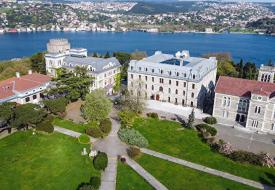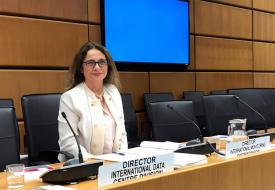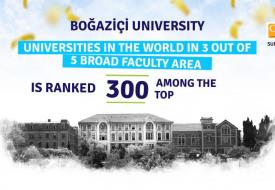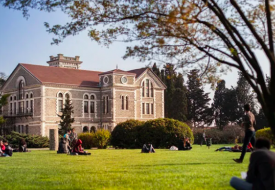Interview with Raja Abillama: A journey from sociocultural anthropology to sociology…
Could we start with a classical question; can you tell us about yourself and your academic background?
My name is Raja Abillama, I was born and raised in Lebanon, which I left in 2002 to pursue doctoral studies in the United States. I am trained in sociocultural anthropologist at the City University of New York. I joined the Department of Sociology at Boğaziçi University in 2019. I teach courses on anthropology, secularism, and the Middle East, and my research is focused on secularism and Lebanese law.
You have studied Architecture in Beirut American University and then Antropology in London, later in New York. And now you are a member of Boğaziçi University Department of Sociology. How your academic career has been shaped and how nutritive for you working on different fields?
My undergraduate degree was in architecture, which I studied at the American University of Beirut. I worked as an architect for a very short time afterward I finished my studies, turning instead towards an academic career. I was introduced to disciplines in the humanities and social sciences as I was finishing my studies in architecture, and these seemed at the time more appealing to me. The making of an architect is a rigorous process, consisting in the cultivation of a highly specialized set of practical skills and knowledge required for the designing of physical spaces, and in a strong theoretical component that involves critical and philosophical reflection on space, the practice of design, and the processes of spatial production.
The practical and theoretical components are obviously connected, but they nevertheless retain a measure of autonomy—you could still work as an architect if you do not have an inclination towards theorizing what you do at the drafting board, and nothing prevents you from thinking theoretically about what architects do when they design a building without your having to do it yourself. The latter scenario put a stronger spell on me for some reason or other, and my thought at the time was that I could pursue the study of space and the design of spaces from within the discipline of anthropology. I thought I could this way keep some sort of continuity in my educational trajectory.
I found two aspects of anthropology, or rather two claims about its uniqueness, to be particularly compelling: its scope—“everything human”—and its methods—“participant-observation.” My passage from architecture to anthropology—two very different disciplines—has no doubt been intellectually and cognitively enriching, but focused specialization is ultimately an inevitable feature of modern scholarship. That being said, thinking about the difference of architecture and anthropology—two very different practices—is a nice way of bringing out some of their distinctive traits and, speaking now as an anthropologist, learn more about anthropology itself.
How your path acrossed with Boğaziçi University and what were the reasons of choosing Boğaziçi?
I first crossed paths with Boğaziçi University as a graduate student in New York in the early 2000s. I made the acquaintance of many Boğaziçi University alumni who were also there for their PhDs—I became good friends with some. Many years later, I came across a job posting announcing an opening for a position at the Department of Sociology. The Department was looking to hire someone with a profile that seemed to me to match my own—someone specializing in the study of secularism and religion. My first visit to campus took place in the summer of 2018. I should perhaps mention another path—more sinuous that one, and of a historical significance—by way of the American University of Beirut, which was also founded in the mid-19th century by American Protestant missionaries.
How COVID-19 effected your academic work and your teaching experience?
The COVID-19 pandemic brought about a sudden shift to virtual or digital teaching and learning, and that in itself has altered in several ways the structure of teaching as a practice. Perhaps the most obvious change is the obliteration of live, or embodied encounters between teacher and students that take place in a physical classroom—a space I had for long taken for granted. In so far as its takes place on something like Zoom, teaching is now fully mediated by a kind of image and a disconnected voice through which we make ourselves available to each other. The student body, individual and collective, is no longer obvious to me. It has been replaced by a multiplicity of tiny “windows” neatly arranged on a screen in front of me through which individuals, somewhere out there, project themselves to each other—a sort of activity that social media has already predisposed us for.
The embodied collective, or communal character of the physical space within which teaching and learning take place is now—hopefully only for now—gone and with it the intimacy of what is a fundamentally oral experience. The latter is now opened up to the possibility of recording, that is, inscription, repetition, archiving, and so on—in other words, it is no longer the same thing. This turn to digital pedagogy with the COVID-19 pandemic has made certain questions in season and somewhat urgent: Are teaching and learning anything but the delivery and consumption of information? If digital or virtual pedagogy is generalized, normalized, what would be done with disciplines that are not easily amenable to technical or technological cooptation?
As far as I understand, secularism has been the base of your recent works and publications. How did you decide work on this subject?
The question of the relationship between religion and the state or politics remains a central issue in public debates and, in some cases, politics and policy, in many countries. France, is an obvious example today, especially after the French president’s recent statements on Islam, but the same could also be said about Egypt, say, the United States, or Turkey. The question is of course differently inflected in each case. In Lebanon, it is the relationship between religious identity and the form of legal and political institutions, or the form and identity of the state, that is at stake in these debates—rather than, say, the appeal to “religious” content in politics—for example, theologically or shari’a informed arguments for or against particular subjects of legislation. There are two features of the Lebanese state whose status has remained unsettled and hence a source of dispute.
One is the constitutional principle of political representation by which the state is organized and at the core of which is the idea of equality between Muslims and Christians. Another is a legal arrangement in which the religious authorities of eighteen officially recognized communities of Christians, Muslims, and Jews hold exclusive jurisdiction over marriage and its consequences—there is no “civil” marriage in Lebanon, nor are there persons who do not belong to one of the communities, no matter what they believe. It is difficult, I would think, for the word “secularism” not to pop up to anyone reading this description!
In the scholarship on Lebanon, the two features of the Lebanese state—the legal and political—are sometimes conflated, or rather viewed as two aspects of the same phenomenon, which in English is called “sectarianism.” The latter has been typically considered to stand as a formidable obstacle against secularism and the secularization of the Lebanese state, by which is meant the exclusion of religion from the public sphere, the institutional separation of religion and the state, and so on. Now this conception of secularism, its adequacy to make sense of states of affairs like the one in Lebanon that I have just described, has been decisively undermined. Novel ways of thinking about the secular have been proposed instead—the secular could still be a useful concept as long as it is, stripped of its normative and ethnocentric presumptions and considered in specific contexts. What could “secular” mean in the Lebanese context? The efforts to make sense of the Lebanese case, I think, might benefit from this rethinking of secularism and the new questions it made possible. On the other hand, a systematic anthropological investigation of the Lebanese case, through the analysis of the entanglements of Christians, Muslims, law, and politics in Lebanon, might be a welcome contribution to secular studies.
Your home country Lebanon has been going on a very difficult period over the last 2 years in terms of economic and political instability... What has been going on now, in terms of people's demands and future expectations particularly after the horrible explosion last August in a country where the spread of the coronavirus and unprecedented economic crisis go hand in hand?
A combination of interpenetrating factors have shaped the Lebanese present. A weak economy and long-standing political instability come to mind first. But there is also systematic environmental destruction—think of the trash crisis a few years ago, or the industrial waste that, as we “found out,” had for years been washed into Lebanon’s largest river—and seemingly deliberate infrastructural decay—manifested in power cuts and water shortages that have led to rapacious privatization of resources.
It is difficult to overestimate the extent to which all of this penetrates people’s bodies and life in Lebanon. The last few years have brought a series of devastating events, pushing things further towards the edge: a debt crisis, the COVID-19 pandemic, and the incredible detonation of the ammonium nitrate pile that was so stupidly stored in one of the hangars at the port of Beirut, in the midst of a dense residential urban area. To make matters worse, people are entrapped between the bullying and blackmail of regional and international powers on the one hand, and an exceptionally predatory (though quite helpless, incompetent, and, mysteriously, not yet entirely de-legitimated) political class on the other. The emotional translation of all of this has been a combination of rage and resignation, both put splendidly on display in the mass protests of the last year, beginning in mid-October 2019.
In these conditions, what are your expectations for the future of Lebanon?
That being said, however, it seems to me that what makes the present in Lebanon so difficult is that what the future looks like, or is to look like, is not at all obvious—that a more or less coherent, and more or less consensual, articulation of a future that makes it possible to expect is not so readily available—yet.













